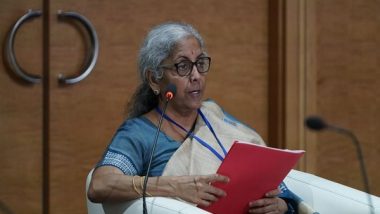Washington, October 14: Union Finance Minister Nirmala Sitharaman participated in the fourth G20 Finance Ministers and Central Bank Governors (FMCBG) meeting and discussed developments in the global economy, global commons, support to vulnerable countries and international taxation as well as climate change and COVID-19 pandemic.
Also Read | China Implements Lockdown in Xinjiang’s Ghulja City Amid COVID-19 Surge.
Held on the sidelines of the Annual Meetings of the International Monetary Fund (IMF) and the World Bank Group (WGB), FMCBGs met under the Italian G20 Presidency.
At the meeting, the Ministers and Governors recognised that global recovery is continuing at a solid pace, mostly due to the rollout of vaccines and the continued policy support, read the G20 statement.
Also Read | Global COVID-19 Caseload Tops 239 Million, Deaths Surge to More Than 4.87 Million: Johns Hopkins University.
In her remarks Sitharaman told her counterparts for global economic recovery, it is essential to keep up the support, build resilience and enhance productivity and structural reforms. These "should be our policy goals," Sitharaman added.
According to a statement released by the G20 post the high-level meeting, members reaffirmed their willingness to continue sustaining the recovery, avoiding any premature withdrawal of support measures as the recovery remains highly divergent across and within countries and exposed to risks.
They agreed to use all available tools for as long as required, in particular, to support the most impacted, such as women, youth and informal and low-skilled workers and remove inequalities.
Ensuring equitable vaccines for all is a key to the global economic recovery but it faces a significant challenge, Union Finance Minister Nirmala Sitharaman told her G-20 counterparts.
Participating in-person discussion on climate change, the finance minister emphasised that considering the varied policy spaces and different starting points of countries, the centrality of climate justice based on the United Nations Framework Convention on Climate Change and principles of the Paris Agreement would be critical for taking forward discussions towards successful outcomes.
Sitharaman stated that the failure in fulfilling the existing international commitments on climate finance and technology 'weakens' the collective efforts of the global community in the fight against climate change.
Sitharaman asked for climate justice to guide further discussions.
The G20 Finance Track remains determined to bring the pandemic under control everywhere as soon as possible, and welcomed efforts towards pandemic Prevention, Preparedness and Response (PPR), the statement added.
Sitharaman appreciated the recent Organisation for Economic Operation and Development (OECD) decision on global tax.
This agreement, she endorsed, helps to address tax challenges arising from the digitalization of the economy and in dealing with Base Erosion and Profit Shifting issues.
For addressing tax challenges arising from the digitalisation of the economy, the G20 FMCBGs endorsed the final agreement as set out in the statement on a two-pillar solution and the Detailed Implementation Plan released by the OECD/G20 Inclusive Framework on Base Erosion and Profit Shifting (BEPS) on October 8, 2021.
The G20 Membership confirmed its commitment to timely and effective implementation of the G20 Roadmap to enhance cross-border payments, welcoming the progress reported against milestones set for 2021.
They also reaffirmed their commitment to enhancing digital financial inclusion of vulnerable and underserved segments of society, including micro, small and medium-sized enterprises (MSMEs), carrying forward the work of the Global Partnership for Financial Inclusion (GPFI) and implementing the G20 2020 Financial Inclusion Action Plan.
In this regard, they endorsed the G20 Menu of Policy Options for digital financial literacy and financial consumer and MSME protection "Enhancing digital financial inclusion beyond the COVID-19 crisis", with the aim to provide a guide for policymakers in their efforts to lay the ground for new financial inclusion strategies in the post-pandemic world, the statement added.
(The above story is verified and authored by ANI staff, ANI is South Asia's leading multimedia news agency with over 100 bureaus in India, South Asia and across the globe. ANI brings the latest news on Politics and Current Affairs in India & around the World, Sports, Health, Fitness, Entertainment, & News. The views appearing in the above post do not reflect the opinions of LatestLY)



 Quickly
Quickly
